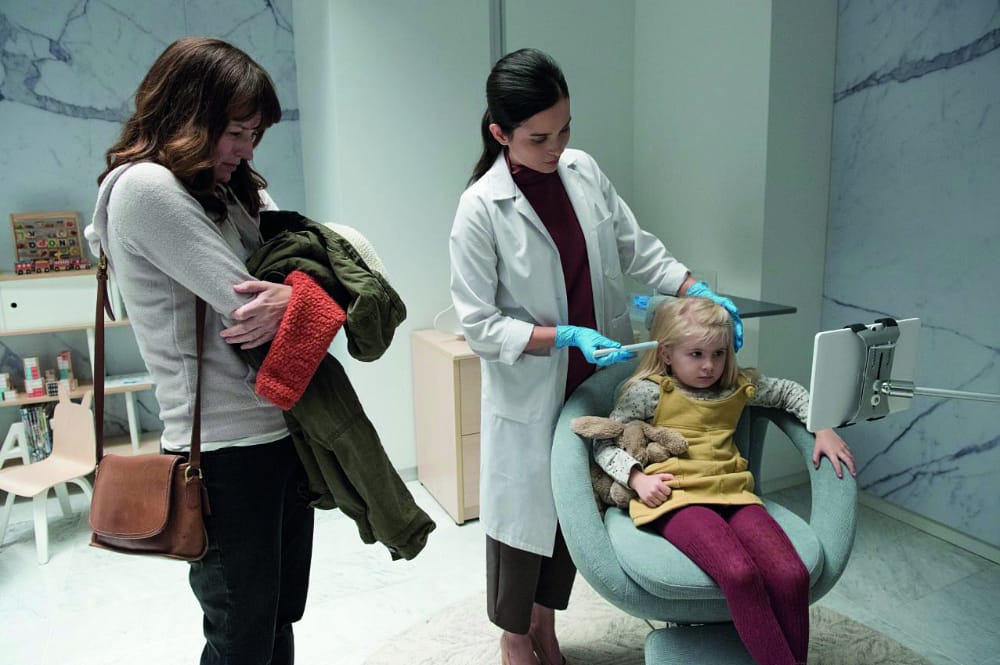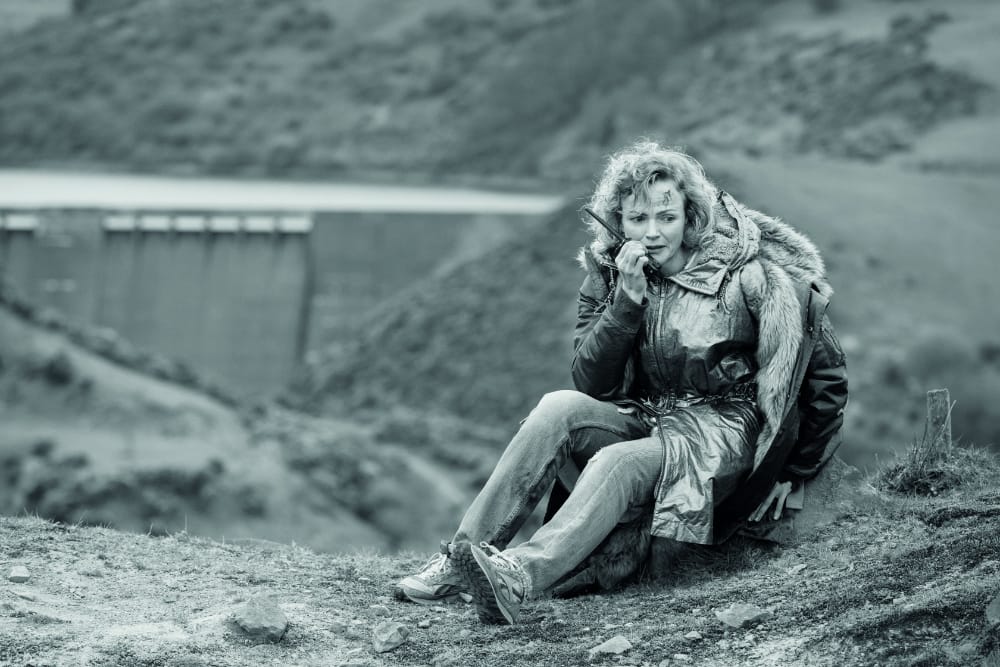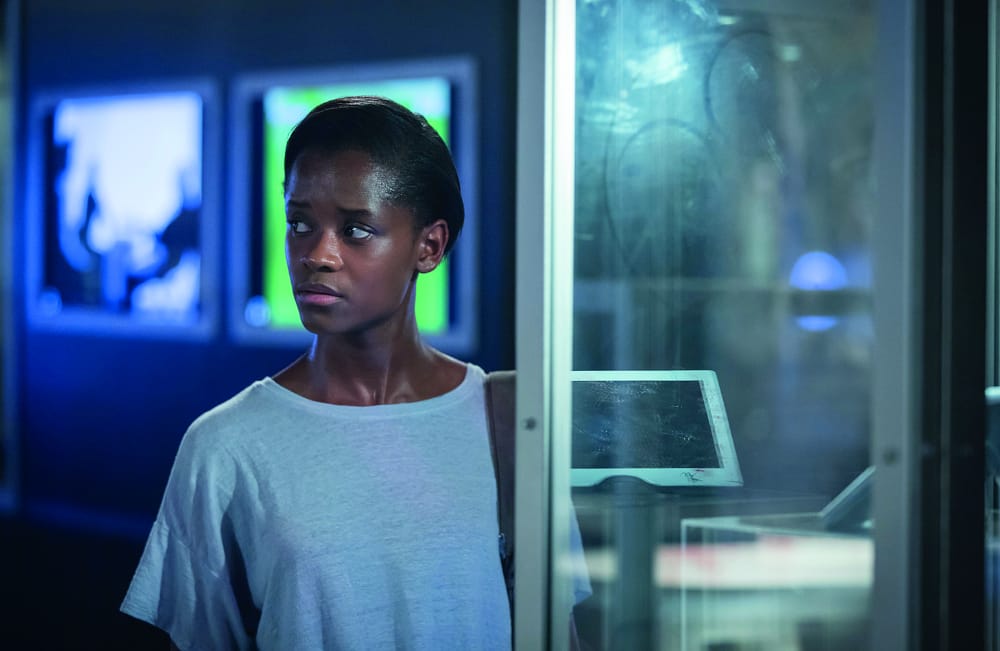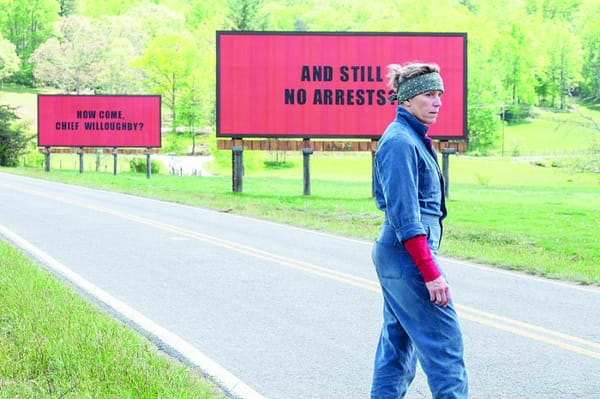Killer robots, memory scanners, and self-driving pizza – welcome to the Black Mirror future
Charlie Brooker is back, with six new episodes of his dark sci-fi anthology. But how do these episodes compare to seasons past? We take you through the highs, the lows, and the weird.

USS CALLISTER
2 STARS
Black Mirror ’s fourth season kicks off with a turn away from the dark, nihilistic tones of earlier seasons, opting instead for a campy parody of a sci-fi classic. Many critics have hailed the opening episode as the best of the season and it’s easy to see why: the story is cohesive, engaging, and well delivered. In the context of any show other than Black Mirror, ‘USS Callister’ would comfortably pass by unnoticed.
However, Black Mirror is not just any other show, and a passable episode that lacks the edge that fans have come to expect from creator Charlie Brooker should not come anywhere near the premiere to a new season. Were ‘USS Callister’ in any of the show’s previous seasons, I would expect to find it tucked away as fourth or fifth billing, so as not to call attention to itself. Unfortunately, Season 4 already has those positions of mediocrity filled by shy, average episodes, so a sappy Star Trek parody is dropped into first place – and ‘USS Callister’ definitely is more parody than homage, complete with snipes at its predecessor’s indulgence of young male fantasies and simple set design. It does, however, use this precis to make an interesting comparison between the ‘nerdy virgin’ stereotype of the ‘80s and ‘90s, and the ‘virgin neckbeard’ of today, a link that is left largely unexplored.
Unlike the majority of Black Mirror ’s many horror stories, this camp fireside tale has a happy ending, with very little lost. For a show that thrives on its dark warnings against tech, this is an odd choice, and the thematic shift away from skepticism is mirrored in other episodes across this season. This episode isn’t the first to end on a wholly happy note, as ‘San Junipero’ from season 3 ends with a wholesome romance. However, ‘USS Callister’ does not share the slow reveal of information leading to an engaging twist that gave ‘San Junipero’ its compelling narrative. AM

ARKANGEL
3.5 STARS
The disappointing aftertaste of ‘USS Callister’ is immediately remedied with a return to what Brooker does best: introducing a plausible technology and allowing the characters’ own decisions on how they use it to be the force that drives the story forward. Showing us how humans naturally abuse the abilities that technology facilitate makes for a much scarier reality than the Tech ex Machina deployed in episodes like ‘Metalhead’.
However, some may see the moral points raised in Jodie Foster’s directing debut as obvious, and less complex than similar episodes from previous seasons. I find that this is an unfair analysis: what Black Mirror excels at is buckling us in, letting us know where the episode is headed, and plowing on towards our destination with the viewer powerless to stop it. But ‘Arkangel’ is unable to solely rely on this tactic, as, for this episode structure to hold up, the plot must not depend on the erratic unreasonable reactions of characters.
Some critics have suggested that the episode does not venture far enough from the obvious moral questions, noting the missed opportunity for the exploration of themes other than helicopter parenting. While ‘Arkangel’ is certainly a fantastic premise, backed by fantastic young acting talent, some may also find the episode does not venture far enough from the most obvious ethical questions. Despite this, ‘Arkangel’ stands out as one of only two episodes this season that feel anywhere near to the Black Mirror of seasons 1 and 2, ending with that warm, familiar sinking feeling that I want from an hour of TV. ‘Arkangel’ is merely a turn back to quality we saw in season 3, and not a step forward. For Black Mirror to remain relevant (which it almost certainly has ample opportunity to) it must not settle for the obvious questions and more obvious answers. AM
CROCODILE
1 STAR
Black Mirror ’s modus operandi – showing us how technological developments will only exacerbate the darkness that lies below our thin veneer of humanity – only works when it straddles the right side of plausibility. It’s a difficult thing to get right, as evidenced by ‘Crocodile’, which is by far the worst episode of the new series thanks to its refusal to represent anything coming remotely close to actual human behaviour.
This time the technology is a device that reads your memories, the setting is somewhere in Scandinavia where everyone has massive houses, and the human instinct is… a propensity to violently murder people? Starring Angela Riseborough as an architect whose boyfriend runs down a cyclist, ‘Crocodile’ explores the classic idea that small lies lead to big lies, but progresses at too fast a pace to allow us to believe in its storyline. In a desperation to draw blood, Brooker’s script has Riseborough’s character going down a road away from plausible humanity, and the result is a schlocky, campy episode. Even its payoff at the end is laughable, like something out of The Scary Door. Riseborough is excellent, as are her co-stars Kiran Sonia Sawar and Andrew Gower, but they are working with exceptionally poor material. There’s only so much they can do with the badly set-up premise.
I demand a full episode centred around the real star of the show: the self-driving pizza delivery van. The future is bright, Mr Brooker. FF
HANG THE DJ
2 STARS
‘Hang the DJ’ is a spiritual successor to season 3’s ‘San Junipero’: both episodes have the same basic structure, following a relationship that blossoms in a setting that is somehow ‘off’, and both end with the revelation that this setting is just some sort of simulation. Unfortunately, this is where the parallels between the two end, and ‘Hang the DJ’ falls short of delivering the same punch that made ‘San Junipero’ season 3’s standout episode.
Where ‘San Junipero’ earned its merit was in the slow, methodical reveal of information that twisted the viewers’ perceptions of the reality presented until the episode finally ‘clicks’. In ‘Hang the DJ’ we are lead down no such track, with only scattered comments by Frank on his doubts about reality and the tenuous fact that pebbles seem to always bounce four times to indicate that something is amiss. This is less a hint and more of a reveal in itself, as from this point onwards the viewer is just left to wait until the episode is ready to reveal that Frank and Amy are just living in a simulation – realistically, there is no other possibility.
Where the episode really falls short of the standard expected is in its final minutes, where we learn that 998 out of the 1000 Frank and Amy simulations realised that the dating game was just a test. Not only does this raise somewhat alarming questions about what the episode has to say about modern dating (that Tinder and its ilk have gamified the dating process?), but also does not seem to provide any solid reason for claiming that the pair are a 99.8% match. Would they have passed the test if they had decided to escape the simulation alone? Earlier seasons of Black Mirror have not relied on chance character decisions, at least on this scale, and the dependence on such this season shows a decline in the quality to be expected of the show going forward. AM

METALHEAD
2.5 STARS
Director David Slade might have put some viewers off with his decision to shoot ‘Metalhead’ in black and white, but the decision is bold, and pays off. Centring around a lone woman (Maxine Peake) escaping from a killer robot – resembling a dog, but with added weaponry – ‘Metalhead’ is visually stunning, from start to finish. Overhead tracking shows emphasise the thrilling desolation of the countryside, its dangerous beauty offset by the vicious robotics on display. We frequently cut from these wide open shots – highlighting the isolation of Peake’s character – to close-ups of her face, creating a claustrophobic atmosphere that contributes to the episode’s sense of unease.
It is clear that Slade’s intention with the episode is to create an unremitting tension within the viewer, and he does this well, putting us on the edge of our seats. As part of the Black Mirror universe, however, something seems missing. It resembles a survival horror – albeit a very good one – which is a genre that has been done to death across TV, film, and video games. And it lacks what sets such horrors apart – a gripping back story. We’re dropped right into the middle of a post-apocalyptic world, with no sort of explanation of how things got to be that way. This is, obviously, a deliberate choice, but then the episode ends with a reveal that tries to impose some kind of narrative where there wasn’t one before – it leaves us wanting more. There are enough individual elements in ‘Metalhead’ to add up to a stellar episode, but they never quite come together to a satisfying whole. FF

BLACK MUSEUM
3 STARS
I saved the best until last. I’d heard from Twitter that this was one of the best episodes of the new season – comparable to standouts from the previous few – packed to the brim with the juicy darkness Black Mirror is known for. And while ‘Black Museum’ did deliver some of the chills you get when an episode is tapping into something really deep, its structure makes it difficult to appreciate as a cohesive whole.
Yes, this is one of those tropes well-loved by writers, and usually disparaged by viewers: the compendium episode, where we have multiple individual stories instead of a single one. In the case of ‘Black Museum’, the eponymous museum plays host to a number of gruesome artifacts and exhibitions, of which we are shows three, in short twenty minute bursts. It begins with its weakest segment, in which a medical device that allows a doctor to feel what their patient feels goes badly wrong – not because of any instinct of human nature, but rather because it simply malfunctions. This is then followed by two better parts, which – despite some flaws – lead up to a conclusion that is genuinely surprising.
But no amount of shock can disguise the fact that this episode isn’t an exceptional idea stretched to its logical conclusion, but three reasonable ideas tacked together, none of which are explored fully. It’s not an awe-inspiring end to the season, but it certainly remains one of the highlights of the lackluster set of episodes on offer. FF








